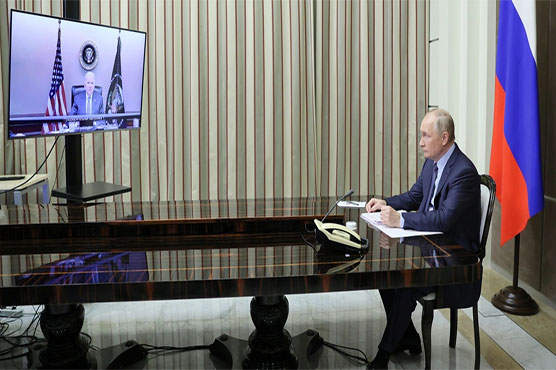Putin asked Biden for 'guarantees' NATO won't expand eastwards: Kremlin

The Kremlin Tuesday described Vladimir Putin's talks with US leader Joe Biden as "frank".
MOSCOW (AFP) - The Kremlin Tuesday described Vladimir Putin s talks with US leader Joe Biden as "frank" and said the Russian president requested Washington provide guarantees NATO will not continue its eastward expansion.
The two leaders spoke in a tense, two-hour virtual summit earlier Tuesday, with Biden warning Putin of a "strong" Western economic response should Russian forces massed on Ukraine s border go on the attack.
"On the whole the talks were frank and professional," the Kremlin said in a statement.
"Russia is seriously interested in obtaining reliable legal guarantees that will exclude NATO s eastward expansion and the deployment of offensive strike weapons in countries adjacent to Russia," it said.
Responding to Biden saying Russia s military build-up near Ukraine s borders was threatening, Putin said the rise in tensions should not be "put on Russia s shoulders".
"It is NATO that is making dangerous attempts to use Ukrainian territory and is building up its military potential at our borders," Putin told Biden, according to the Kremlin.
The Russian leader has repeatedly said Moscow seeks legal guarantees from the West that Ukraine will not become a NATO launchpad and criticised US-led military exercises in the Black Sea.
The US and its allies have for weeks warned that Russia may be planning an invasion of Ukraine.
During the talks, Putin also suggested to Biden that Moscow and Washington lift all restrictions on embassy staff in both countries, the Kremlin said.
"The Russian side proposed to annul all the accumulated restrictions on the functioning of diplomatic missions, which could also serve to normalise other aspects of bilateral relations," the Kremlin said.
Consular services at the US embassy in Moscow have been severely hindered after Russia banned the mission from employing local staff as part of tit-for-tat sanctions.
The embassy warned in October that it could stop performing most functions next year unless there is progress with Russia on increasing the number of visas for diplomats.

